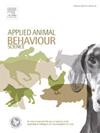The effects of cow-calf-contact rearing on dairy animals’ social traits – a pilot study
IF 2.2
2区 农林科学
Q1 AGRICULTURE, DAIRY & ANIMAL SCIENCE
引用次数: 0
Abstract
Early separation of the calf from the dam, mostly within 24 h after birth, is common for dairy cows, but cow-calf contact (CCC) rearing gets increasing interest from both practice and science. CCC rearing allows calves suckling their dam or foster cows for several weeks after birth. The early social environment can impact the development of social behaviour and personality traits. In this study, we investigated the effect of CCC as compared to early separation and rearing in a calf group during the first three month of life on social traits. Eighteen female Black-and-White-German-Holstein heifers and calves reared in a CCC system (Contact, n = 9) or with early separation and milk from an automated milk feeder (Automat, n = 9) in the first 12 weeks of life were studied after weaning (at least 6 months old) in two situations – in their respective social group and in a sociality test. The spontaneous social behaviour was recorded for 5 h per animal in the home pen via direct observation. The sociality test was performed in a familiar environment and comprised an isolation phase of 5 min followed by a 5 min reinstatement phase. Behaviour during the sociality test was analysed from video recordings. In addition, video material from the calving pens provided insights into the type and quantity of maternal care six Contact animals had received on the 1st and on the 3rd day of their life. Treatments were compared using linear mixed models for observations in the home pen and ANOVA for the sociality test with treatment, group and, partly, their interactions, as well as age and weight as independent variables. Potential associations of maternal contact behaviour with Contact animals’ affiliative interactions later in life were analysed by Spearman rank correlations. Contact animals showed more subordinate behaviours in the herd (P = 0.004). In isolation they were vigilant more often (P < 0.001) and looked longer towards the exit (P = 0.014) than artificially reared animals. However, we found no treatment effect on the frequency and duration of affiliative behaviour, nor animals’ latency to re-join their peers during the reinstatement-phase. There was a positive correlation between the amount of maternal contact received in the first days of life and the initiated affiliative (P = 0.043) and received affiliative interactions (P = 0.016) of Contact animals later in life. The results of our pilot study add some evidence in line with earlier findings suggesting that the allowance of maternal contact affects animals’ sociality and their social competence, i.e. reacting appropriately in social situations, later in life. In addition, the amount of maternal care seems to affect later affiliative behaviour. However, further research is needed with a larger number of animals and further social situations and challenges.
求助全文
约1分钟内获得全文
求助全文
来源期刊

Applied Animal Behaviour Science
农林科学-行为科学
CiteScore
4.40
自引率
21.70%
发文量
191
审稿时长
18.1 weeks
期刊介绍:
This journal publishes relevant information on the behaviour of domesticated and utilized animals.
Topics covered include:
-Behaviour of farm, zoo and laboratory animals in relation to animal management and welfare
-Behaviour of companion animals in relation to behavioural problems, for example, in relation to the training of dogs for different purposes, in relation to behavioural problems
-Studies of the behaviour of wild animals when these studies are relevant from an applied perspective, for example in relation to wildlife management, pest management or nature conservation
-Methodological studies within relevant fields
The principal subjects are farm, companion and laboratory animals, including, of course, poultry. The journal also deals with the following animal subjects:
-Those involved in any farming system, e.g. deer, rabbits and fur-bearing animals
-Those in ANY form of confinement, e.g. zoos, safari parks and other forms of display
-Feral animals, and any animal species which impinge on farming operations, e.g. as causes of loss or damage
-Species used for hunting, recreation etc. may also be considered as acceptable subjects in some instances
-Laboratory animals, if the material relates to their behavioural requirements
 求助内容:
求助内容: 应助结果提醒方式:
应助结果提醒方式:


